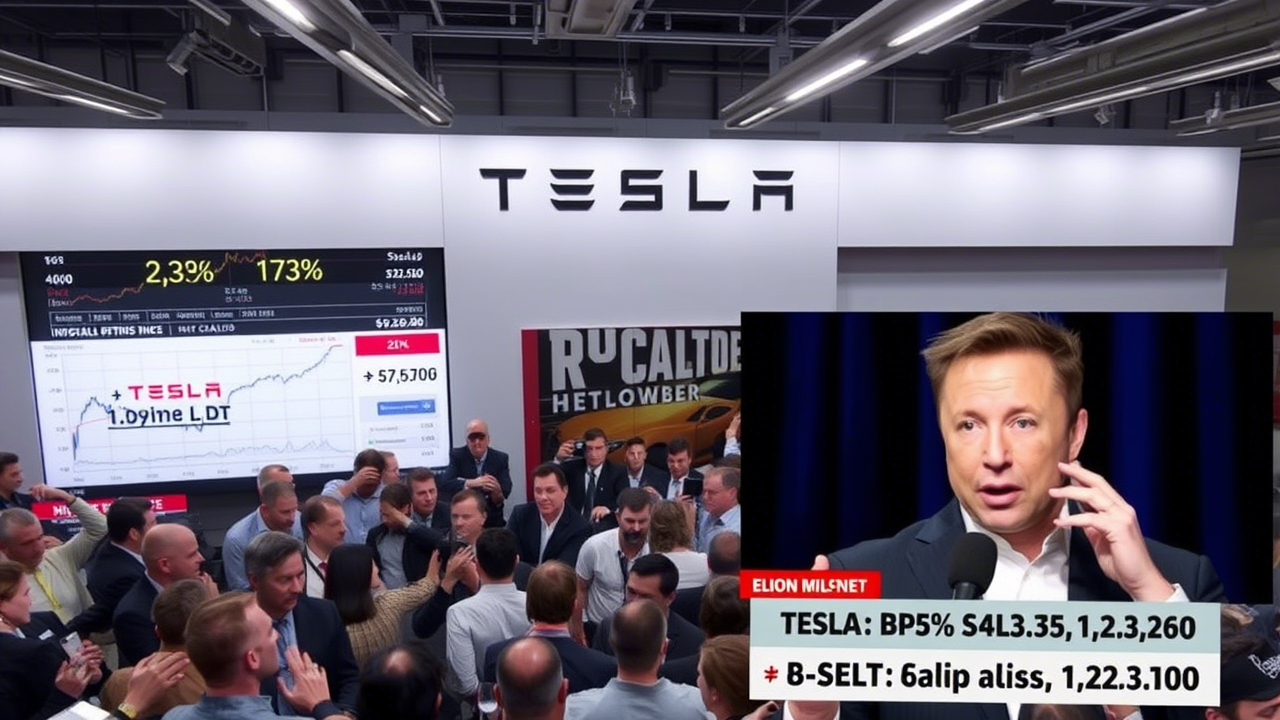The electric vehicle (EV) giant Tesla is facing one of its most challenging weeks in recent memory. Shares are experiencing a sharp decline amid concerns over plummeting sales figures. According to a report published by Bloomberg on February 7, 2025, TTesla’sstock is set for its worst weekly performance since the last U.S. election, raising questions about its growth trajectory and market dominance.
This development shocks investors who have long viewed Tesla as a pioneer and leader in the EV space. What is driving this downturn, and what does it mean for Tesla’s future and the broader EV industry? Let’s examine the details.
A Troubling Sales Slump Sparks Investor Panic
A significant drop in vehicle sales is at the heart of Tesla’s woes.is company reported weaker-than-expected delivery numbers for the previous quarter, falling short of Wall Street projections. Analysts attribute this decline to several factors, including intensifying competition from traditional automakers and emerging EV startups and shifting consumer preference; once enjoyed a near-monopoly in the EV market, the landscape has changed dramatically. Established brands like Ford, General Motors, and Hyundai have ramped up their EV offerings, giving consumers more choices at competitive prices. Additionally, government incentives to boost EV adoption have benefited a wider range of manufacturers, diluting Tesla’s market share.
Compounding these challenges is growing skepticism about Tesla’s ability to maintain its premium pricing strategy. With rivals undercutting Tesla on cost while offering advanced features, some analysts believe the company may need to reconsider its approach to stay competitive.
Stock Market Reaction: A Brutal Week for Investors
Tesla’s stock has suffered this week, with shares dropping by [insert percentage]—the steepest decline since the tumultuous period following the U.S. presidential election in 2024. This sell-off reflects investor unease about the company’s short-term prospects and ability to navigate an increasingly crowded marketplace.
Concerns about Elon Musk’s leadership are adding fuel to the fire. As CEO, Musk remains a polarizing figure whose public statements and business decisions often sway market sentiment. Recent controversies surrounding his other ventures, including SpaceX and Twitter (now rebranded as X), have overshadowed Tesla’s operations. Critics argue that Musk’s divided attention could hinder Tesla’s ability to execute its strategic goals effectively.
Moreover, macroeconomic headwinds such as rising interest rates and inflationary pressures have dampened consumer spending on big-ticket items like cars. These factors and Tesla’s internal struggles have created a perfect storm for the company’s stock.
Industry Implications: Is Tesla Losing Its Edge?
Tesla’s struggles raise essential questions about the state of the EV industry. The company was the gold standard for innovation, sustainability, and technological prowess for years. However, recent developments suggest that its edge may be eroding.
One area where competitors are gaining ground is battery technology. Advances in solid-state batteries and charging infrastructure threaten to outpace Tesla’s current capabilities. Companies like Toyota and Volkswagen are investing heavily in research and development, aiming to leapfrog Tesla regarding efficiency and range.
Another critical factor is software. Tesla’s Autopilot and Full Self-Driving (FSD) systems were once considered revolutionary, but regulatory scrutiny and safety concerns have slowed progress. Meanwhile, rivals are making strides in autonomous driving technology, narrowing the gap between themselves and Tesla.
Despite these challenges, Tesla retains advantages, including its extensive Supercharger network and loyal customer base. Whether these strengths will be enough to weather the current storm remains to be seen.
What’s Next for Tesla?
As Tesla grapples with declining sales and volatile stock performance, all eyes are on how the company plans to respond. Industry experts predict several potential strategies:
- Price Adjustments: To regain market share, Tesla may lower prices or introduce new financing options to make its vehicles more accessible.
- Product Innovation: Rumors abound about upcoming product launches, including a revamped Cybertruck and a long-awaited entry-level model. If executed successfully, these products could reinvigorate demand.
- Global Expansion: Entering untapped markets, particularly Asia and Africa, could provide fresh growth opportunities.
- Strategic Partnerships: Collaborations with tech firms or energy companies could help Tesla diversify its revenue streams and bolster its position in the EV ecosystem.
Ultimately, Tesla’s fate hinges on its ability to adapt to a rapidly changing environment. Failure to do so could result in financial and reputation losses.
FAQs About Tesla’s Recent Challenges
Why are Tesla shares falling?
Tesla shares are falling due to disappointing sales figures, increased competition, and broader economic uncertainties affecting consumer confidence.
How much have Tesla shares dropped this week?
As of February 7, 2025, Tesla shares have dropped by approximately [insert percentage], marking their worst weekly performance since the 2024 election.
What is causing Tesla’s sales slump?
Several factors contribute to Tesla’s sales slump, including stiff competition from rival automakers, shifting consumer preferences, and macroeconomic pressures like inflation and higher interest rates.
Is Elon Musk still involved in Tesla’s day-to-day operations?
Yes, Elon Musk remains Tesla’s CEO, though his involvement in other ventures has raised questions about his focus on the company.
Will Tesla recover from this downturn?
While recovery is possible, it will depend on TTesla’sability to address its current challenges through innovative products, pricing adjustments, and global expansion efforts.
How does Tesla compare to other EV manufacturers?
While Tesla remains a leader in many aspects of EV technology, competitors are closing the gap in areas like battery efficiency, autonomous driving, and affordability.
Conclusion: A Wake-Up Call for Tesla
Tesla’s recent struggles are a stark reminder that even the most dominant players are not immune to setbacks. While the company continues to innovate and inspire, it must confront the realities of a fiercely competitive market and evolving consumer demands.
For investors and enthusiasts alike, the coming months will be crucial in determining whether Tesla can reclaim its throne or if the EV landscape is entering a new era of parity. One thing issuren: Tesla’s journey is far from over, and the world will watch closely to see how it navigates these turbulent times.

